Workshop on Discrete
Models for Genetic Regulatory Networks
Workshop on Discrete Models for Genetic
Regulatory Networks Considered a Success
 |
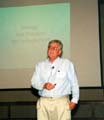 |
 |
 |
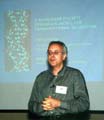 |
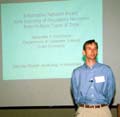 |
 |
 |
 |
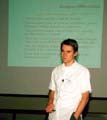 |
 |
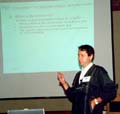 |
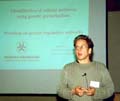 |
Click on image to enlarge
|
The first ever workshop on Discrete Models for Genetic
Regulatory Networks, hosted by the Department of Electrical Engineering
and the Genomic Signal Processing Laboratory at Texas A&M
University, could be the next step in finding cures for certain
diseases using genomic signal processing.
The workshop, which also was sponsored by the Texas A&M Office of
the Vice President for Research and the Translational Genomics Research
Institute (Phoenix, AZ), brought together both experts in the field of
genetic regulatory networks, as well as students interested in pursuing
such careers.
“There have been conferences on systems biology where similar topics
have been covered, but I have not seen any conferences specifically on
the topic of modeling genetic regulatory networks,” said Dr. Ed
Dougherty, professor in the electrical engineering department at
A&M and chairman for the workshop.
The workshop consisted of invited short lectures by researchers and
featured a keynote address by Dr. Stuart Kauffman, a pioneer and
leading theorist in complexity science.
Kauffman has been researching genetic networks for more than 35 years.
He co-founded BiosGroup with Ernst & Young in 1996 and has served
as the company's chairman. Previously, he was a founding member of the
Santa Fe Institute, where he is now an external professor, in addition
to serving as professor emeritus at the University of Pennsylvania
School of Medicine. Currently, he is a professor at the University of
Mexico Health Sciences Center.
Kauffman also has held a consulting position since 1985 with Los Alamos
National Laboratory, where significant early work on chaos theory was
conducted. A six-year MacArthur fellow, he is the author of several
highly regarded books on complexity science, including Origins of Order
(1993), At Home in the Universe (1995) and Investigations (2000).
Topics during the workshop included probabilistic (and deterministic)
Boolean networks, Bayesian networks, other models for discrete genetic
regulatory networks and measures of multivariate gene interaction.
Speakers pictured in alphabetical order included from top:
Maximino Aldana Gonzalez, University of Chicago
Mike Bittner, Translational Genomics Research Institute
Aniruddha Datta, Texas A&M University
Leon Glass, McGill University
John Goutsias, Johns Hopkins University
Alexander Hartemink, Duke University
Ronaldo Hashimoto, University of Sao Paulo
Stuart Kauffman, University of Mexico Health Sciences Center
Seungchan Kim, Translational Genomics Research Institute
Harri Lähdesmäki, Tampere University of Technology
Ilya Shmulevich, University of Texas M. D. Anderson Cancer Center
Ioan Tabus, Tampere University of Technology
Jesper Tegnér, Stockholm Bioinformatics Center and Royal
Institute of Technology
The workshop was a high-class event bringing together some of
the best people in the field. It was great for students to interact
with these researchers in person and hear people like Stuart Kauffman,
one of the pioneers in this area. Ed Dougherty deserves high praise for
organizing an outstanding event on this campus.--Shankar
P.Bhattacharya, Texas A&M University.
The informal nature of the workshop and the critical mass
of researchers deeply interested in modeling genetic regulatory
networks created a perfect setting for stimulating in-depth discussions
and establishing new collaborations.--Ilya Shmulevich.
The conference provided me with an overview of the ways in
which models and data analysis techniques were being used to help
understand data being generated using modern molecular biology tools,
and offered some ideas about the ways mathematics will be useful in
helping to use the data to better understand biological mechanisms and
to eventually treat disease.--Leon Glass.
The workshop on Discrete Models for Genetic Regulatory
Networks that took place at Texas A&M was one of the most enjoyable
and intellectually satisfying workshops that I have attended the last
few years. Kudos to professors Ed Dougherty and Ilya Shmulevich for
organizing this wonderful and enjoyable workshop.--John Goutsias.
I think the workshop was very profitable. I liked the
format (two-day, 50-min talks) and the fact that we had access to
pioneers in the field such as Stuart Kauffman and Leon Glass.--Ulisses
Braga-Neto, University of Texas M. D. Anderson Cancer Center.
The meeting at Texas A&M on Discrete Models for Genetic
Regulatory Networks was a great success. For the first time it brought
together those who have explored discrete, often Boolean models of
genetic regulatory networks, where work is exploding, with others using
dynamic Bayesian networks and other models of inference and machine
learning to attack the major problem in system biology of understanding
genetic regulatory networks in the broad sense of genes, RNA, proteins,
and networks of interactions among these predominant classes of
molecules by which a cell, and tissues of cells coordinate the
dynamical behavior of the network. New mathematical, experimental, and
experimental design concepts will be needed to successfully attack this
problem. The conference is an early step in this direction.--Stuart
Kauffman.
Considering the success of the workshop, Dougherty said he
definitely hopes to have another workshop sometime in the near future.
“My plan is to hold a second meeting in two years.”